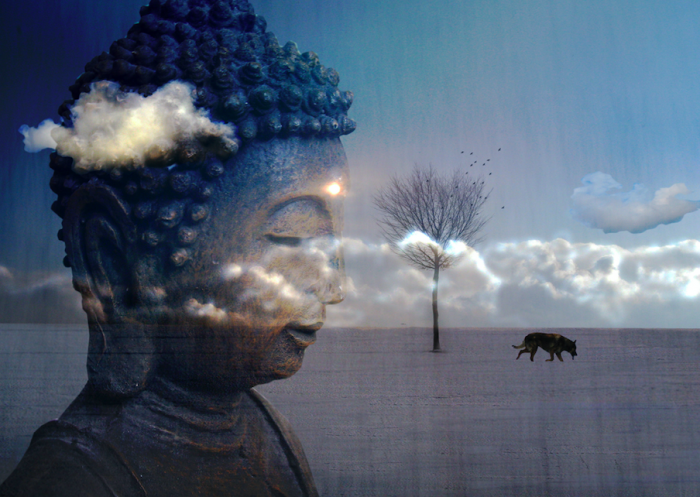Are there days when you feel like an empty cup, an over-soaked sponge, or a wilted flower?
If you are striving to live in service to the world, to create a more beautiful world, to protect any part of this suffering world, then you are living against the current.
You have chosen a life of warriorship, meaning, and deep love, but also a life of struggle. You have chosen to live a different story than the one that is being told to you and performed all around you.
As a schoolteacher, I know that it’s one thing to kindle inspiration for a lesson, a day, or even a year of teaching, but the classroom can wear you down. Any kind of purposeful work with others can leave us sapped. It’s not just that we get tired—we lose faith. Our clarity that our work is meaningful gets shaken and we doubt that we have anything to offer.
Here are three powerful practices that we can infuse into our practice of engaged living. They are always helpful and always available. They can help us and others around us at the same time.
1. Stand Like a Mountain.
Some days we are tired or depressed, and our overall life force feels low. In response, we might adopt the posture of a wilted flower. The shadowy feeling of low energy gets into our body, like dampness, and we slouch.
Body and mind are one system, so when our body sags, our mind sags. On the other hand, a lot of us bustle and rush about in a frantic, disembodied way. How we handle our body has a deep influence on our state of mind. Body and mind together create our presence—the field of energy around us—which in turn has a powerful impact on others around us—our children, coworkers, friends, adversaries, and so on.
To “stand like a mountain” means to recognize and appreciate the experience of being an embodied human. Our bodies are a treasury of wisdom-wealth. They reveal to us what is genuine in our experience—our natural response to life’s flow that is always alive and moving, like a silk scarf in the breeze of immanent change.
Even though this feeling dimension of experience is so palpable, it often stays hidden. Our cerebral, screen-oriented culture can help us forget we even have a body that is more than a thing that needs food and gets tired.
Learning to live in the body, and learning to listen to the body, is a lifelong practice, but we work on it one moment at a time. A starting place is to stand (or sit) like a mountain:
>> Notice how you’re holding your body; gently adjust your posture by sitting up if you’re slouching.
>> Relax the shoulders and allow your shoulder blades to melt down and in.
>> Feel your feet connecting to the earth (your body is the earth; the earth is your body).
>> Feel the strength and dignity that reside in the body, even when it’s tired or sick.
>> Rest for a bit, even two seconds, like a mountain that just abides in the midst of everything.
>> Be a relaxed but immovable presence for whoever you are with.
2. Flow Like a River.
Engaged warriors are constantly interfacing—with people, systems, concepts, situations, emotions, trauma, and sometimes technology. When we feel strong and inspired we can mop up all of the energy and challenges of these interactions like a boss, but when we get overwhelmed, we begin to feel diminished. We feel like a tiny sponge that’s trying to soak up a puddle and is already saturated.
When we feel overwhelmed, we start overlooking what is most important in the situation, which is the relational energy that lives between us and others. In reality, we are all deeply connected to one another, but in this age of separateness and individualism, we often lose track of this.
Loneliness and isolation result, and the lifeforce of society is damaged.
Just as the life of ancient civilizations relied on the nourishment of rivers, we depend on the life-giving energy of connection that flows like a river through our interactions. When we acknowledge one another, we unblock that energy. Rather than exhausting us, our interactions nurture a relational sense of self.
When we feel overwhelmed, we usually want to push others out, to make space around ourselves. Instead, in this practice, we make space within. We drop what we’re carrying in our minds and open.
Flowing like a river means attuning ourselves to others. In the bubbling cauldron of human interactions, we feel the living quality of others. The way they are being right now—their posture, their eyes, their voices, their vibrancy, their sadness—just let them flow in. Don’t listen to their words alone. Notice them and care for them—this is what they need from you.
Genuine listening, in which we relinquish our ego and open our ears, open our minds, and open our hearts to others, is a deep practice that benefits us as well. Such listening is sacred—it holds and acknowledges joy and grief, our whole human experience. It has the power to unravel knots of confusion and soothe the heart.
Listening may seem neutral because we are letting our plans and opinions drop away, but it doesn’t feel neutral. It feels like a river—we feel the flowing, bubbling, singing, changing, and alive energy of communication that connects us. It’s like plugging in.
Flow like a river:
>> Drop your agenda—let go of your tasks and busy-ness (just for now—don’t worry, you’ll still get your work done).
>> Go quiet—drop your inner agenda; make your being available and open, the body softens, the field of hearing expands, the eyes brighten.
>> Listen—use your ears, eyes, and whole being to sense and feel the communication of human energy that is taking place. It’s not just the words, it’s the whole, mutual aliveness that you share.
>> Flow—enjoy the energy as it blurs the boundaries around your small, disconnected self and nourishes a felt sense of living interconnection.
3. Shine Like the Sun.
Engaging and working with others can be a real struggle when we get worn out and our inspiration dries up. When we feel like an empty cup, we lose our joy and the feeling of possibility. While a lot of different factors contribute to burnout, one of them is that many of us rely too much on the wrong things for nourishment.
When we draw our motivation too much from hope for success, we become overly invested in outcomes, and fail to honor the dignity of effort and the wholeness of others we work with.
When we rely on ideas to inspire us, we become disheartened and offended when others don’t care for (or hate) them.
When we want to help because we love others we feel wretched when our hearts aren’t in the game (like when a teacher dislikes a student, gasp!).
None of these motivations are bad, it’s just that they can be fickle. They come from outside of us. But we can learn to source our energy and motivation from within our own being rather than fostering dependency on external inspirations. This can also help us become more equanimous and present with others.
Connecting to our inner being is something we learn primarily through meditation. By learning to rest with ourselves in meditation, we discover that there is an abiding, peaceful energy within us. Most of the time, we identify with our thoughts, which are neither abiding nor peaceful—they are constantly fluctuating and often conflicted. But thoughts occur within a field of awareness. That awareness is always there—open, bright, and uncontrived. It is like the Tao—inexhaustible. Therefore, it nourishes us when we connect with it.
When we fixate, we remain tangled in thoughts and we lose much of our awareness. Trust is the key to reconnecting. Trust develops through an inner shift that we can learn to make. Rather than fixating on our thoughts or planning how we will manage ourselves, we just let ourselves be. We trust that we don’t need to struggle to prop ourselves up. We can just be who we are. Fundamentally, we are peaceful, spacious awareness.
As we develop trust, our whole being begins to communicate something powerful to others—they begin to intuit that someone who accepts herself may also have the capacity to trust and accept them on a deep, human level.
Shine like the sun:
>> Recognize fixation—are you caught up in tangles and loops of thoughts? Don’t judge, just notice.
>> Trust—thoughts are like clouds. Awareness is the sky. The sky does not need help being the sky. Relax. Shift, even for a moment, into awareness.
>> Shine—allow your sense of being to radiate out with natural warmth and clarity. Allow your sense of self to go big and envelop others within that genuine, trusting environment.
~









Read 4 comments and reply